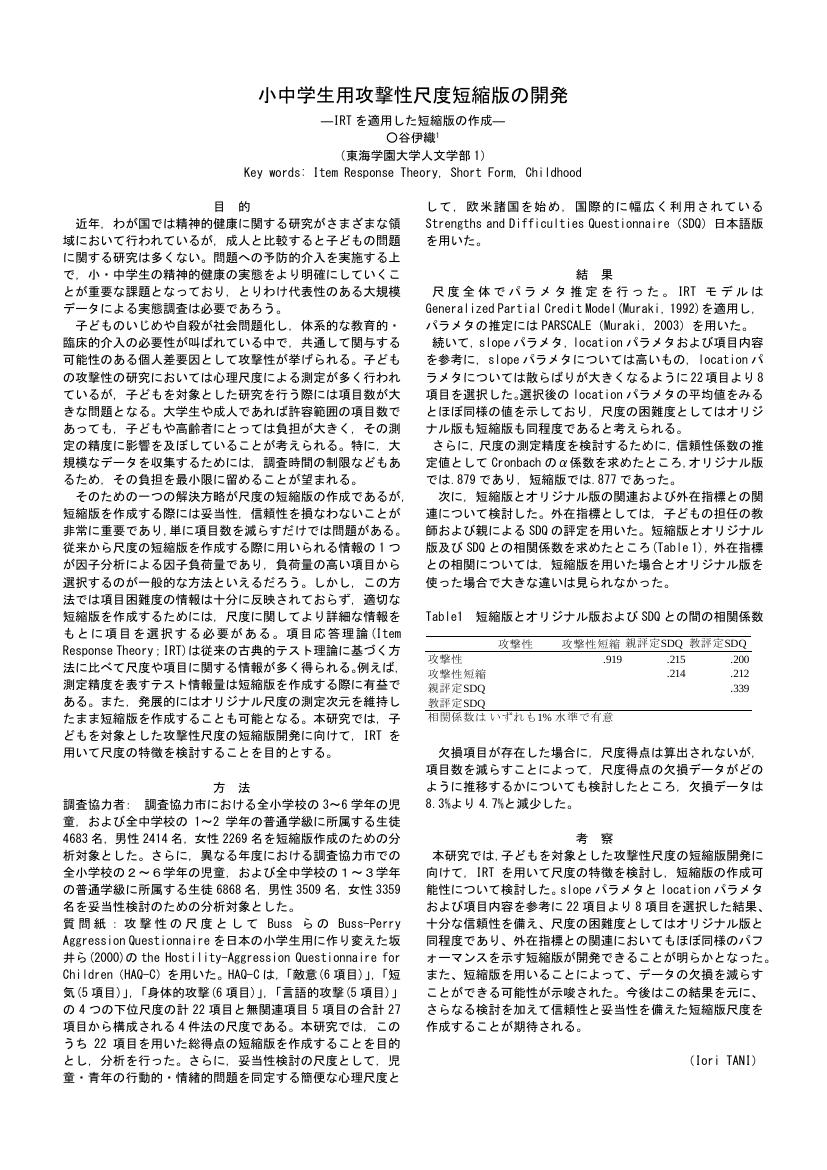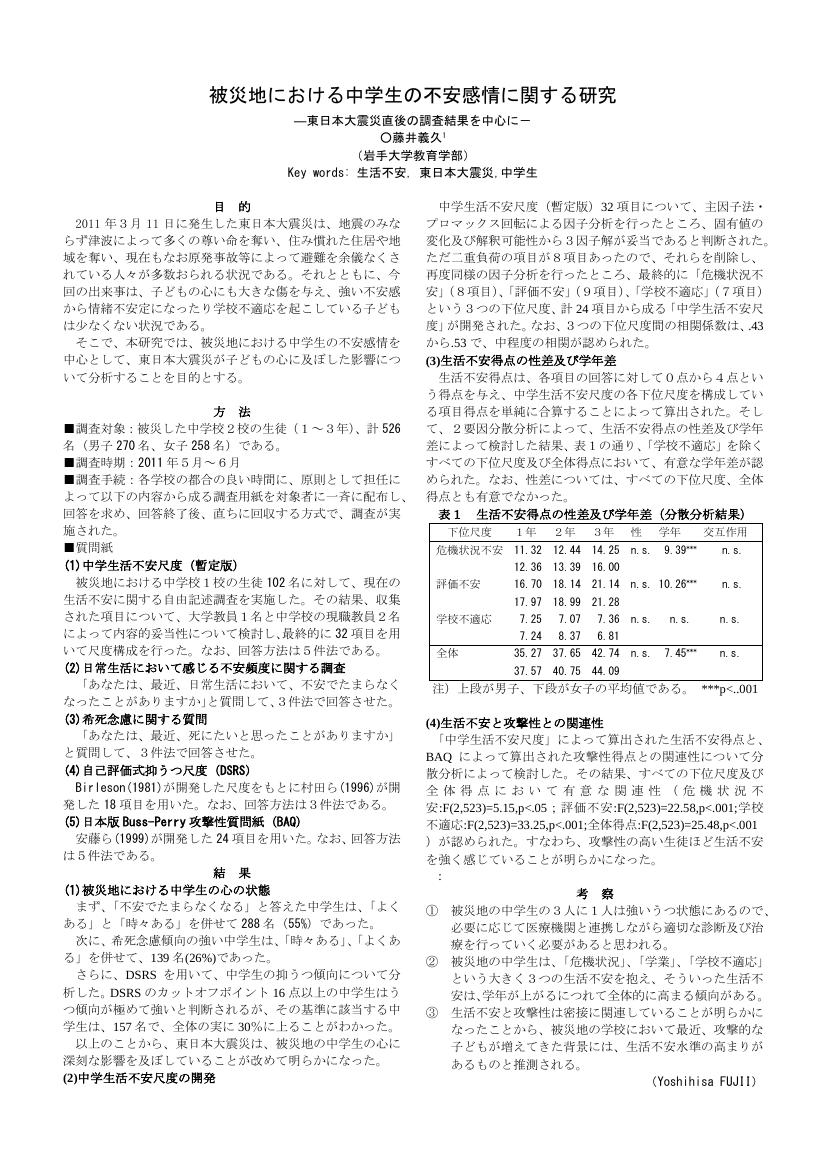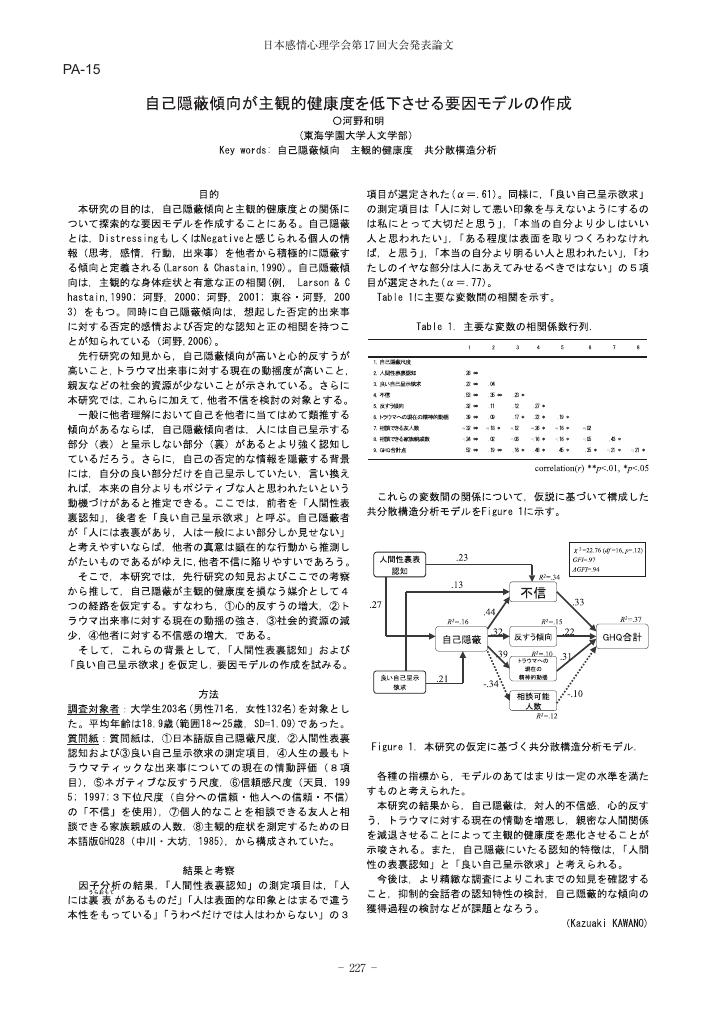1 0 0 0 OA 過去経験の日常的想起における気分の影響
- 著者
- 多田 美香里
- 出版者
- 日本感情心理学会
- 雑誌
- 感情心理学研究 (ISSN:18828817)
- 巻号頁・発行日
- vol.5, no.2, pp.61-69, 1998-03-31 (Released:2009-04-07)
- 参考文献数
- 34
- 被引用文献数
- 1 1
Two tests examined whether mood congruent memory bias is found in the daily recall of personal past event. Subjects described their memories about past events unexpectedly recalled, and then completed the questionnaire to assess affective value of their past events and to assess their mood states both at the time recalled their past events and at the time tested. When affective value of past event was evaluated by desirability, mood effect was not found (Test 1). While, when past event was evaluated by the same measure as mood rating, subjects who were in the positive mood recalled more positively past events than those in the negative mood (Test 2). The difference between the results of two tests was discussed with respect to the variety of affective value rating for memory and mood reparative effect. In addition, these results suggest that mood has an influence on unexpected memory process as daily recall.
1 0 0 0 OA 閾下感情的プライミング効果の検討
- 著者
- 小川 時洋 鈴木 直人
- 出版者
- 日本感情心理学会
- 雑誌
- 感情心理学研究 (ISSN:18828817)
- 巻号頁・発行日
- vol.5, no.2, pp.70-77, 1998-03-31 (Released:2009-04-07)
- 参考文献数
- 22
- 被引用文献数
- 2 1 1
本研究は,Murphy&Zajonc(1993)の報告する閾下感情的プライミング現象と,その生起に関わる要因を検討することを目的として行った。実験1では先行研究に準じた,プライムの閾下提示群,閾上提示群を形成して実験を行った。その結果,閾上提示群では,ターゲットの評価がプライムの誘意性に左右される強いプライミング効果が見られたが,閾下提示条件では見られなかった。実験2は,実験1の結果を踏まえ,プライムの存在に対する被験者のアウェアネスの役割を検討し,プライムが見えていることが効果の生起に決定的な役割を果たすことを示唆する結果が得られた。実験3および実験4は,閾下刺激の効果に焦点をあて,ターゲット刺激の特性,試行間間隔,プライム刺激提示時の視角,同一ターゲソトの反復提示などの要因を統制した。しかしながら,実験3,および実験4のどちらにおいても閾下プライミング効果は見出されず,先行研究の一般性に疑義を呈する結果となった。
1 0 0 0 OA 社交不安傾向者の回避行動に対するCreative Hopelessnessの効果
- 著者
- 酒井 美枝 増田 暁彦 木下 奈緒子 武藤 崇
- 出版者
- 日本感情心理学会
- 雑誌
- 感情心理学研究 (ISSN:18828817)
- 巻号頁・発行日
- vol.21, no.2, pp.58-64, 2014-02-01 (Released:2014-06-04)
- 参考文献数
- 14
- 被引用文献数
- 1
Creative Hopelessness is intended to decrease the client’s motivation to control the unpleasant thoughts and emotion in Acceptance and Commitment Therapy. The main aim of this study is to investigate the effects of the Creative Hopelessness on the subjective measures of believability and motivation of Change Agenda. Change Agenda is the rules expressed in the following lines: if I could control undesirable thoughts and emotion, I could solve the problem. Undergraduate students (N=35) with high social avoidance tendency were randomly assigned to Creative Hopelessness group, Control group, or Placebo group. Creative Hopelessness group received a psychological education about the futility of making efforts to control unwanted thoughts and feelings. Control group received a psychological education to increase the motivation to control the unpleasant thoughts and emotion. Placebo group received a psychological education of the general clinical psychology about anxiety. The reduction of believability and motivation of Change Agenda following the intervention were found only in the Creative Hopelessness group.
1 0 0 0 OA 小中学生用攻撃性尺度短縮版の開発
- 著者
- 谷 伊織
- 出版者
- 日本感情心理学会
- 雑誌
- 感情心理学研究 (ISSN:18828817)
- 巻号頁・発行日
- vol.21, no.Supplement, pp.1-1, 2013 (Released:2013-09-19)
- 被引用文献数
- 1
1 0 0 0 OA 被災地における中学生の不安感情に関する研究
- 著者
- 藤井 義久
- 出版者
- 日本感情心理学会
- 雑誌
- 感情心理学研究 (ISSN:18828817)
- 巻号頁・発行日
- vol.21, no.Supplement, pp.19-19, 2013 (Released:2013-09-19)
1 0 0 0 OA 反すうにおけるワーキングメモリ内容の更新過程
- 著者
- 西村 春輝 望月 聡
- 出版者
- 日本感情心理学会
- 雑誌
- 感情心理学研究 (ISSN:18828817)
- 巻号頁・発行日
- vol.21, no.Supplement, pp.32-32, 2013 (Released:2013-09-19)
1 0 0 0 OA 抑うつ傾向と外的・内的注意切り替えの円滑さの関連
- 著者
- 伊里 綾子 望月 聡
- 出版者
- 日本感情心理学会
- 雑誌
- 感情心理学研究 (ISSN:18828817)
- 巻号頁・発行日
- vol.20, no.Supplement, pp.36-36, 2013 (Released:2013-04-10)
1 0 0 0 OA 自己隠蔽傾向が主観的健康度を低下させる要因モデルの作成
- 著者
- 河野 和明
- 出版者
- 日本感情心理学会
- 雑誌
- 感情心理学研究 (ISSN:18828817)
- 巻号頁・発行日
- vol.17, no.3, pp.227, 2010-03-25 (Released:2011-02-20)
1 0 0 0 OA 抑うつ的反すうの持続を測定する面接課題の作成
- 著者
- 長谷川 晃
- 出版者
- 日本感情心理学会
- 雑誌
- 感情心理学研究 (ISSN:18828817)
- 巻号頁・発行日
- vol.20, no.2, pp.47-55, 2013-02-20 (Released:2013-04-10)
- 参考文献数
- 20
- 被引用文献数
- 1 1
The purpose of the present study was to develop the Depressive Rumination Interview Task (DRI task), an interview method to assess the perseveration of depressive rumination, and to investigate the validity of rumination steps emitted in the task. Sixty one undergraduate and graduate students participated in the study. Participants completed self-report measures of depressive rumination (Negative Rumination of the Japanese version of the Response Styles Questionnaire) and depression (the Japanese version of the Zung Self-Rating Depression Scale). They also undertook the DRI task. In this task, participants answered the questions “Why is it that X makes you feel depressed?”, where X was either the initial topic of depression they mentioned, or their response at the previous step. The number of rumination steps emitted in the DRI task significantly positively correlated with depression (r=.29, p<.05), and marginally significantly positively correlated with self-report measure of depressive rumination (r=.24, p<.10). These results suggested moderate validity of rumination steps. It was suggested that refinement of the DRI task and re-examination of the validity of rumination steps emitted in the task were needed. Improved assessment methods of depressive rumination will contribute to a better understanding of this perseverative negative thinking.
1 0 0 0 「こころのケア」再考—被災地支援報告
- 著者
- 大澤 智子
- 出版者
- 日本感情心理学会
- 雑誌
- 感情心理学研究 (ISSN:18828817)
- 巻号頁・発行日
- vol.20, no.1, pp.29-32, 2012
Since the Great Hanshin Awaji Earthquake in 1995, media reports on importance of mental health services for survivors and service providers, and hundreds of mental health teams were coordinated and dispatched to the disaster areas right after the Great East Japan Earthquake and Tsunami last year. However, how much of such services were truly welcomed and utilized by the survivors? Some argue that the concept of mental health itself is western born hence it does not really fit with Japanese culture. This paper, however, points out aftereffects of disaster are universal but how they are expressed might be influenced by culture, social structures, and individual differences. And survivors in general need support to recover but it does not have to be ‘mental health’ per se, and it is up to providers' ability in how to present it so that mental health service is accepted and utilized. Examples from author's experiences are included to make points.
- 著者
- 関谷 大輝 湯川 進太郎
- 出版者
- 日本感情心理学会
- 雑誌
- 感情心理学研究 (ISSN:18828817)
- 巻号頁・発行日
- vol.20, no.1, pp.9-17, 2012
People doing emotional labor need to suppress their feelings as a part of their job. As a result, they suffer from persistent work stress. We examined if writing disclosure about secondary emotions by using cell phone text messages is an effective intervention against the stresses of emotional labor. Participants who engaged in interpersonal work were randomized to the following groups: (a) experimental condition consisting of participants who wrote about secondary emotions for three consecutive weeks (<i>N</i>=6), (b) control-writing condition consisting of participants who recorded their daily life activities, such as sleeping time for three consecutive weeks (<i>N</i>=6), and (c) no-writing condition (<i>N</i>=8) consisting of participants that only responded to a questionnaire. Changes in emotional dissonance, burnout, frequency of recalling the job, and secondary emotions were assessed on three occasions. Results of ANOVAs indicated that participants in the experimental condition had a significant reduction in all variables except secondary emotions at follow-up. These results indicate that written disclosures about secondary emotions may restrain the progression of burnout in emotional laborers.
- 著者
- 吉田 琢哉
- 出版者
- 日本感情心理学会
- 雑誌
- 感情心理学研究 (ISSN:18828817)
- 巻号頁・発行日
- vol.20, no.1, pp.1-8, 2012
The present study focused on an acquisition of personal growth through anger-inducing events among female adolescents. Negative emotional events are frequently shared with intimate others. Promotion of reappraisal and social support perception in social sharing would be dependent on disclosure-recipients' response. Personal growth would also be obtained through negotiation with anger-inducing targets. It was thus hypothesized that trial of revision, receptive response in social sharing, and constructive expression toward anger-inducing targets would facilitate personal growth. Results supported the hypothesis solely for whom anger-inducing events were socially shared. Only trial of revision had positive influence on personal growth among who did not disclosed the anger experience. These results were discussed with respect to characteristics of the events.
1 0 0 0 OA 感情制御の自動性
- 著者
- 青林 唯
- 出版者
- 日本感情心理学会
- 雑誌
- 感情心理学研究 (ISSN:18828817)
- 巻号頁・発行日
- vol.18, no.2, pp.135-145, 2011-01-31 (Released:2011-09-01)
- 参考文献数
- 49
Emotion regulation has been viewed as a deliberate strategy to modulate one's undesirable state. Accordingly, much of the previous emotion regulation researches have examined conscious and deliberate ways of emotion regulation. Recently, however, some researchers began to explore the automaticity of emotion regulation. Their approach to the automatic emotion regulation integrates paradigms and constructs from research on automaticity and deliberative emotion regulation. This article reviews assumptions and theoretical backgrounds put forth by recent advances in automatic emotion regulation research which utilizes automatic goal pursuit and emotional priming techniques, a radical departure from basic methods employed in previous emotion regulation research. Finally, future directions for automatic emotion regulation research will be discussed.
1 0 0 0 OA 日本語による心理学論文執筆スキル
- 著者
- 田村 亮
- 出版者
- 日本感情心理学会
- 雑誌
- 感情心理学研究 (ISSN:18828817)
- 巻号頁・発行日
- vol.17, no.3, pp.190-198, 2010-03-25 (Released:2011-02-20)
- 参考文献数
- 6
In recent years, the importance of demonstrating one's own achievements has increased signi.cant-ly. Most noticeably, the number of research articles that survives rigorous peer reviews is frequently being used as an index to measure eligibility for an academic position or research grant. Therefore, almost all of researchers often find themselves being pressured to write academic papers. On the other hand, writing academic papers can be quite di.cult for those who have never written them. This article provides a brief tutorial for writing academic papers in Japanese language. However, there already are some good manuals which explain writing paper such as Tsuzuki (2006) or Rosnow & Rosnow (2006). Therefore I wish to demonstrate how to write academic papers in Japanese language based on my own experiences. This article consists of two parts. The first one describes how to write academic papers for each section of an article, namely “purpose” “method” “result” and “discussion”. The second part presents comprehensive strategies in writing academic papers.
1 0 0 0 OA 説得に及ぼすユーモアの種類と量の効果
- 著者
- 牧野 幸志
- 出版者
- 日本感情心理学会
- 雑誌
- 感情心理学研究 (ISSN:18828817)
- 巻号頁・発行日
- vol.6, no.1, pp.1-16, 1998-09-30 (Released:2009-04-07)
- 参考文献数
- 40
The present study examined effects of the types and the amount of humor on persuasion and the mechanism involved. A 2 (the types of humor: aggressive humor or playful humor)×2 (the amount of humor: a lot or a little) factorial after-only design with two control groups was used. Two hundred and twenty-eight college students were randomly assigned as subjects to one of six conditions. Dependent variables were receivers' attitudes, moods, evaluation of message, and evaluation of sender. As for the attitude, playful humor enhanced the persuasive effects than aggressive humor in a lot of humor. A lot of humor enhanced the persuasive effects than a little of playful humor. The comparison with the control groups suggested that adding a lot of playful humor facilitated persuasive effects of the message that didn't have enough effects. As for other dependent variables, following tendencies were noted: 1) Aggressive humor arouse more negative mood to receivers than playful humor, 2) A lot of humor lessened evaluation of the specialty of sender than a little. Finally, the results of correlation and path analysis showed that perception of playful humor positively related with positive mood.
- 著者
- 高田 琢弘 湯川 進太郎
- 出版者
- 日本感情心理学会
- 雑誌
- 感情心理学研究 (ISSN:18828817)
- 巻号頁・発行日
- vol.19, no.3, pp.98-105, 2012-05
1 0 0 0 OA 日本人を対象とした誇りの非言語的表出について
- 著者
- 有光 興記
- 出版者
- 日本感情心理学会
- 雑誌
- 感情心理学研究 (ISSN:18828817)
- 巻号頁・発行日
- vol.17, no.3, pp.246, 2010-03-25 (Released:2011-02-20)
- 参考文献数
- 2
1 0 0 0 OA 弁明としてのウソが利益とコストの評価に及ぼす影響
- 著者
- 菊地 史倫 佐藤 拓 阿部 恒之 仁平 義明
- 出版者
- 日本感情心理学会
- 雑誌
- 感情心理学研究 (ISSN:18828817)
- 巻号頁・発行日
- vol.16, no.3, pp.220-228, 2009 (Released:2009-03-19)
- 参考文献数
- 21
We investigated how the costs and benefits of telling a lie affect a person who is lying in an attempt to avoid punishment. One hundred and sixty-eight college students were asked to read three scenarios in which the protagonist gave an excuse for arriving late to an appointment. Excuses given for arriving late were: an incredible lie (a lie invoking an unlikely event as an excuse), a credible lie (a lie invoking a plausible event as an excuse), and the truth. Participants then rated the perceived degree of benefit (forgiveness and impression) and the behavioral and emotional costs associated with each excuse, and finally chose the “best” excuse for avoiding punishment. The incredible lie was ranked highest in terms of costs and benefits, the credible lie received moderate ranking, and the truth received the lowest ranking. Participants tended to choose the credible lie, ranked moderately in terms of costs and benefits, as the “best” excuse. The results suggest that people do not act to maximize benefit but rather to avoid high cost when making an excuse to avoid punishment.





